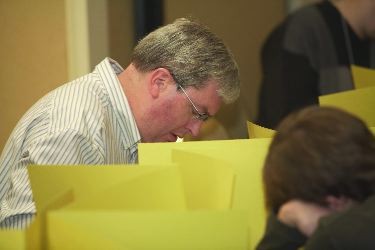Across and down

Following in the tradition of Spellbound (about kids participating in a national spelling bee) and Word Wars (about Scrabble players), the charming small-scale documentary Wordplay captures the fervor with which many Americans approach the New York Times daily crossword puzzle.
Director Patrick Creadon focuses on dapper, unflappable Will Shortz, crossword editor of the Times since 1983, who as a college student devised a major in enigmatology at the University of Indiana. He also follows one of the most frequent and resourceful “crossword constructors,” Merl Reagle, who provides a lesson in how to assemble a puzzle around the theme of wordplay. We see the glee and the admiration of several devoted puzzlers as they figure out the theme of Reagle’s puzzle.
The movie also visits last year’s national crossword contest. Shortz initiated this annual event in 1978 to create a community of puzzlers, in cheerful defiance of the solitary nature of crossword puzzling. (There are exceptions to that trait; some addicts, like the folk-rock Indigo Girls, work on the Times puzzle together.)
As human comedy-drama, the scenes of the competition held annually in Stamford, Connecticut, can’t compete with the spectacle of middle-schoolers spelling their hearts out. But it’s fun to watch a ballroom full of contestants meet the challenges of Shortz’s seven crosswords and especially to see how the three finalists (Al Sanders, a middle-aged computer programmer from Colorado; Trip Payne, a 30ish whiz from Fort Lauderdale; and the prodigious 20-year-old Rensselaer undergraduate Tyler Hinman) deal with the pressures of working on the final puzzle on stage in front of their peers. This is the only round that conveys anything like the excitement of a spectator sport; in showing the previous rounds, Creadon has to rely on time-lapse editing to dramatize this most sedentary of pastimes.
On the evidence of Creadon’s camera, puzzle experts seem to be mild-mannered. So the most interesting aspect of the contest is the way in which the escalating tension contrasts with the player’s natural placidity. You’re caught off guard at the emotion of one of the finalists when he comes close to, then botches, a chance at victory.
The movie is at its most engaging not when it deals with the competition (which is, after all, Shortz’s invention and not an intrinsic element of crosswords) but when it lights on marginalia. And that’s appropriate, since what crosswords do is illuminate and elevate marginalia.
Among the Times crossword’s most faithful fans, we learn, are documentary filmmaker Ken Burns, Yankee pitcher Mike Mussina and Jon Stewart, the host of the Daily Show (who carries on an imaginary conversation with Shortz while he’s working away at the puzzle, urging him, “OK, bring it, Will!” and protesting, “Don’t get cute with me, Will!”). Another is Bill Clinton. Not surprisingly, Clinton is the crossword’s most articulate spokesman: without ever invoking politics directly, he uses the puzzle as an ingenious metaphor for more profound sorts of problem-solving.
Longtime Times crossword addicts already know that on Election Day 1996 the puzzle offered a clue pertaining to the following morning’s big news story, one that could be answered by either “Clinton” or “Bob Dole” and still fit with the surrounding words. Clinton figured out the clue and alerted Dole (who seems less amused by the puzzle’s cleverness than his rival is).
My favorite story in the film comes from Jon Delfin, a puzzler who by profession is an accompanist for theatrical auditions. Delfin talks about how his work draws on the same skills as crosswords. Auditioners often present him with sheet music he’s never seen before. One day a female vocalist asked him to play “It Might as Well Be Spring,” an early Rodgers and Hammerstein ballad of which he is particularly fond. Instead of playing a simple accompaniment, he began to improvise on the melody. The singer fell into his groove, and suddenly, he recalls, her focus was no longer on the people for whom she was performing—her potential employers—but on Delfin, whom she recognized as a fellow artist. “That was beautiful,” she enthused when it was over.
Crossword-solving may not be an art, but the mutual appreciation of two musicians for each other’s skill at filling in the blanks can perhaps be seen as the apotheosis of puzzling.





